So, what does it take to be a good musician? Is Playing A Guitar A Talent Or Skill? Can you be successful with one but not the other? In this article, I’ll reveal what it takes to become a good player and dispel some myths about the learning process.
You can use the table of contents below to take you to the area that interests you. Click on the little box to open it, and then click on the section of the article you want to read, or you can read from start to finish if you want the full guitar learning experience!
The Short Answer
Playing the guitar requires talent and skill. Everyone has some degree of musical talent! You need to develop playing skills, no matter how talented you are. Anyone can learn to play with the right approach and enough practice. Talent, skill, intelligence, and creativity can all factor into the learning process. Don’t let anyone discourage you from learning, and you will succeed!
Keep On Reading (Below) To Learn More
Talent Vs. Skill: What’s The Difference?
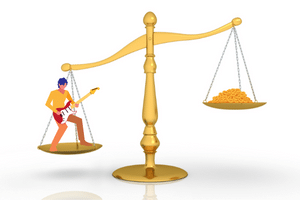
Simply stated, a talent is something you have a “built-in” aptitude for, allowing you to learn faster and achieve results that others may find very difficult or too challenging.
A skill is something that is nurtured and progressively developed with repetition and consistency.
Although having talent can make things considerably easier, when it comes to playing the guitar or any other instrument, even if you don’t have a lot of talent, you can become an excellent player by developing the necessary skills.
Is Talent Better Than Skill?
No, not really. The most talented guitar players have to work hard to develop the skill to express their talent to the fullest. Some of the most gifted players practice the longest to achieve their goals.
Talent is not a magical ability. It’s an aptitude that takes effort to develop and pair with the necessary skills.
So, talent and skill are not totally separate entities. Everyone has some degree of talent that has to be brought out by learning various skills. I have never met anyone with no musical talent in my years of playing and teaching guitar.
Is Playing Guitar A Natural Talent?
Most people don’t demonstrate a great deal of natural talent on the guitar from the beginning. However, playing the guitar can come naturally to some, who seem to learn quicker and easier than others and develop a great deal of artistic expression.
Players with natural talent can be self-taught or schooled. Some gifted players can play well without even knowing where individual notes are on the guitar neck or the names of the strings!
For example, Jimi Hendrix never took a guitar lesson and learned everything by listening to and observing other players. However, that doesn’t mean he didn’t practice to achieve the necessary skills! Jimi’s father is quoted as saying that Jimi practiced on a broom before he even got a real guitar!

Other very talented players, like Steve Vai, are schooled musicians. Steve took guitar lessons from Joe Satriani and graduated from the Berkeley College of music. You can’t get a better musical education than that! However, Steve still needed to practice as much as nine hours a day and sometimes more!

Therefore, although very talented guitar players are more likely to learn on their own, wanting to seek musical instruction does not mean that you are less gifted!
Developing Guitar Playing Skill

Developing guitar playing skills all comes down to practice and dedication. The best way to do this is to create a practice schedule and stick to it. This is the road to technical mastery!
It’s not unusual for beginners to quit because of fingertip soreness before they form calluses on their fingertips. Don’t let this happen to you!
Related Article ➡ Fingertips Hurt Playing Guitar? – How To Stop The Pain!
Practice develops “muscle memory” and hand-eye coordination.
There are numerous examples of musicians who developed their skills through hard work and practice.
For example, Andre Segovia is considered the father of classical guitar. I’m certainly not saying that Andre did not have natural talent, but he still had to develop the necessary playing skills to achieve his goals!

He spent the better part of a lifetime rearranging classical masterpieces to accommodate the range of the guitar and developed many of the necessary playing techniques that made it possible.
Combining Talent And Skill To Achieve Success
Combing your talent with practice and dedication to develop the skills you need is the best way to be a successful guitar player.
The more natural talent you have, the more you will be able to achieve on your own. However, taking lessons in-person or online with video instruction can accelerate your progress. These days, there are so many ways to improve playing skills that anyone can learn to play guitar.
Don’t be fooled into thinking that because you have a natural talent for music, you don’t need to develop skills in certain areas to become the guitar player you want to be.
Pros & Cons Of Playing By Ear Vs. Reading Music


Here are some of the pros and cons of how you learn to play the guitar. Of course, combing both types of learning will give you the best of both worlds!
Playing By Ear
| Pros | Cons |
|---|---|
| More fun than learning to read music | Requires more musical talent |
| Caters to your creative side | May only take you so far |
| Can be more satisfying | Not appealing to more disciplined players |
| Focus on what you like best | May limit musical repertoire |
Reading Music Or Tabulature
| Pros | Cons |
|---|---|
| Gives you the ability to play any musical genre | Requires more practice by repetition |
| Could make you more professionally marketable | May be difficult finding accurate transcriptions |
| More attractive to disciplined players | Creative people may have difficulty with it |
| Can expand musical repertoire | Can limit learning your favorite material |
Keep On Reading (Below) To Learn More About Each Topic
Can Someone Without Talent Learn To Play?

As I stated above, everyone has some degree of talent; it just has to be brought out by having a positive attitude and confidence in your ability. Anyone can become an excellent player without being awesomely musically gifted.
It is true that the more natural musical talent you have, the quicker and farther you are likely to progress, but everyone can learn to play the guitar well with the proper effort and practice consistency!
We hear the term “tone deaf,” but no one has zero musical ability except those with a rare underlying medical problem! People often use that term to avoid trying to learn to play an instrument or as a justification to quit playing because it requires too much effort. Don’t be one of those people! Stick with it, and don’t get discouraged! Playing the guitar will give you a lifetime of happiness!
Related Article ➡ 20 Guitar Tips For Beginners That You Must Know!
Is It Hard To Learn To Play Guitar?
Like all worthwhile endeavors, playing the guitar has a learning curve that must be surmounted to acquire the basic playing principles.
Above and beyond this, the degree of difficulty depends on your natural talent, the skill level you want to achieve, the amount of effort you are willing to put in, and your learning method.
Those who want to learn to play basic open chords in the first position on the guitar neck will find it relatively easy. However, it will be more challenging and time-consuming if you want to learn to play barre chords, arpeggios, and scales up and down the neck.
Players looking to “master” the guitar will realize that it can take a lifetime and still not know everything!
It all depends on how far you want to go.
Related Article ➡ Learn To Play A Guitar Fast – Best Tips And Tricks!
Why Some People Play Guitar Better Than Others

There are many reasons why some people become better guitar players than others.
Performance Requirements
Some players use the guitar to accompany themselves in a fundamental way, placing more emphasis on their vocal performance. They learn the basic open chords and use a capo to adjust the song’s pitch to their vocal range.
This is not uncommon and is a perfectly legitimate approach to playing the guitar (so I’m not putting you down in any way!). They build an audience based on their lyrics and can have fun with things like performing and having sing-alongs.
Other players like to emphasize the technical aspects of their playing, which requires more learning and practice.
Natural Talent
It’s true that enough natural talent can give your guitar playing an edge if you are willing to put in the practice required to develop your playing skills.
Many players overestimate the usefulness of having talent. If they can’t learn to play well quickly and with minimal effort, they blame it on a lack of talent and give up.
Dedication
Dedication is a crucial determinant of how good a guitar player you will become. The better you become, the more difficult it may be to progress to the next level without a strict learning schedule and consistent effort.
Lack Of Confidence
Confidence in your ability is key to success, no matter what you do! Self-confidence can get you through the difficult early stages of learning to play the guitar.
How many people have you heard say that they would love to play the guitar but are afraid it’s too difficult? Forget “fear of failure!” To make your dreams come true, you have to believe in yourself!
Physical Limitations
Some people with illnesses like arthritis in their hands or eyesight and hearing problems can face additional challenges playing the guitar. But there’s always a way to overcome a handicap if you want to do something bad enough!
Guitar Quality
It’s possible that the guitar you play could be holding you back. For example, if the strings on the guitar are too thick or too high from the fretboard’s surface, they can be difficult to press down. Also, the guitar may be too big, especially for children with small hands.
I find that, more often than not, the quality of the guitar is not preventing someone from playing better or improving. They need more practice!
Playing Better Vs. Sounding Better
There can be a difference between playing better and sounding better. Playing better is related to talent and skill level, and better players will also sound better. However, having a good tone on your instrument can also depend on the quality of the guitar or amplifier you use.
A poor player will sound bad with even the most expensive equipment, and an excellent player can make a cheap guitar sound better than it is!
As you become a better and better player, it’s natural to buy equipment that will give you a particular or improved sound. For example, a Stratocaster played through a Deluxe Reverb amp will sound very different than a Les Paul played through a Marshall stack!
Related Article ➡ Why Is My Guitar Tone So Bad? -Massively Improve Your Sound!
Is Musical Talent Related To IQ?
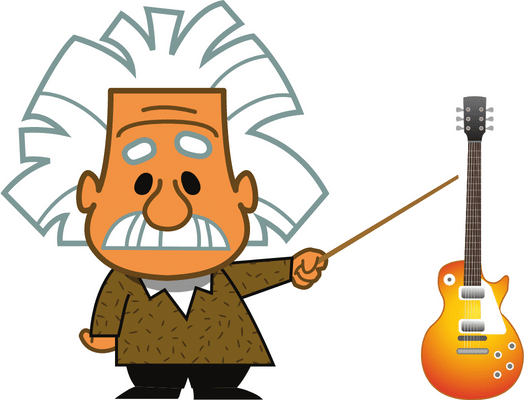
So, do you have to be “smart” to be talented on the guitar or any other instrument? The role of intelligence in learning to play a musical instrument is a difficult question to answer.
Some incredibly smart people have very little musical talent, and vice-versa.
In my opinion, intelligence and creativity can be a factor in your playing ability, style, and the genre of music you play. Here are some basic generalizations I’ve noticed about guitar players over the years, with notable exceptions.
Classical guitarists approach music from a more disciplined and analytic point of view. As a result, they learn almost exclusively from sheet music and don’t typically embrace more creative concepts, like improvisation. Nevertheless, I’m certainly not putting down this excellent approach to music!
Jazz guitar players like to approach the guitar from an intellectual and creative point of view. They rely on understanding complex concepts in music theory and using those concepts to rearrange musical pieces and improvise around melodic passages.
Country, Rock, and Metal players typically rely more on creativity and improvisation and put less emphasis on music theory than Jazz players. However, they’re equally impressive in their own right!
Does this mean classical guitarists are smarter or more talented than metal players? Not necessarily! However, I do think that many of the best players take both an analytic and creative approach to their playing.
Can Playing Music Make You Smarter?
The answer to this may surprise you! A growing number of scientific studies show that listening to music regularly or playing an instrument can enhance brain development and function, especially in children.
Music has been shown to light up multiple areas of the brain by increasing activity across the Corpus Callosum, which connects the creative right and analytic left side.
People who play music regularly may show improvements in memory, problem-solving ability, and hand-eye coordination.
So, will playing the guitar turn a person of average intelligence into a genius? That’s not going to happen, but we can all benefit from enhanced brain function!
Don’t Let Others Discourage You From Trying!
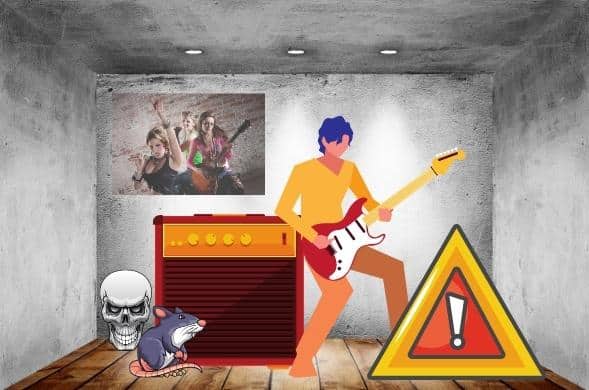
It’s important not to listen to people who have tried to play the guitar and failed! Instead, align yourself with people that have faith in your ability to succeed in whatever you want to do.
The truth is that anyone can play the guitar if they are willing to put in the effort. You’ll never know how good you could be unless you give it a go!
So, what are you waiting for? Find someone who enjoys playing and is willing to give you some pointers or take some lessons from a pro to get you started.
Frequently Asked Questions

Here are some of the questions I get asked about playing the guitar.
If your question does not appear here, please put it in the comments, and I will get right back to you with an answer.
Is Being Good At Guitar Genetic?
Scientists have not isolated a gene that makes people better at playing music. However, musical talent seems to run in some families. It’s unclear if that’s because family members are exposed to music at an early age, if there is a genetic component, or both.
Can I Play Guitar If I Have No Nails?
Yes, it is not necessary to have longer nails to play the guitar. Some players grow the nails on their right hand longer for fingerpicking the strings. However, the nails on the left hand should be on the shorter side to effectively fret the strings.
Can I Learn Guitar In 7 Days?
You can learn the rudiments of playing the guitar in 7 days, like the names of the strings, the notes on each string in the first three frets, some basic open chords, and how to tune the guitar.
Learning to play the guitar well does take time. The more you want to know, the more time it will take. Some players study the guitar most of their life.
What Is The Hardest Thing To Learn On Guitar?
There is no one thing that is hardest to learn. Most players have trouble playing barre chords. Learning to play chords, scales, and arpeggios all over the neck can take years. Learning which scales and arpeggios to play over each chord can be very challenging.
Can A Non Singer Play Guitar?
Yes, there are many fabulous guitar players that don’t sing. Singing and playing an instrument are two separate processes.
Can You Learn To Play The Guitar At Any Age?
Yes, you are never too young or old to learn to play the guitar. Young children may require a guitar to accommodate the size of their hands. Elderly players can need things like visual or hearing adaptive equipment.
Related Article ➡ Learning Guitar For Seniors – Make Each Day Great With Music
Final Thoughts

I hope this article on “Is Playing A Guitar A Talent Or Skill” opened your eyes to the fact that anyone can learn to play effectively!
Talent is not the same as skill. Anyone can learn to play the guitar, no matter how little talent you have! Those gifted with a high level of musical talent still require effort and consistency to develop the performance skills required to make them good players. Some players have remarkable musical talent, allowing them to take the guitar to a different level.
Learning to play “by ear” and from written music or tablature each has its advantages and disadvantages. I think the best approach is to know how to do both!
The guitar can be a difficult instrument to learn, depending on the depth at which you want to master it. For those who are primarily singers that wish to accompany themselves on the guitar, it shouldn’t take long to acquire that skill set. On the other hand, guitarists that want to become virtuosos in their musical genre can study the guitar for a lifetime and never run out of things to learn!
Learning to play better is not necessarily the same as sounding better. Although you will sound better with practice, a good tone is also a matter of having the proper equipment.
The Bottom Line
Talent, skill, intelligence, and creativity can all factor into how well you play the guitar, and playing an instrument may actually make you smarter!
Don’t let anyone discourage you from trying to play or keep improving on the guitar! Instead, surround yourself with people that love music and will encourage you to be the best you can be!

Here’s a video from Thomas Michaud that talks about the roles of talent and skill development in being able to play the guitar. Check it out!
Related Article ➡ What Makes A Guitarist Unique – The Secret To Standing Out!
Tell Me What You Think
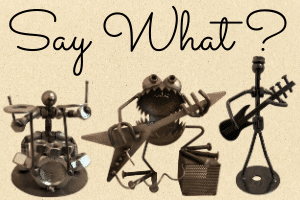
Please leave a comment below if you enjoyed this article, have any questions about talent vs. skill, or want to give your point of view. I will be happy to help you.
- Did musical talent help you when you began playing the guitar? How?
- What are the most important things you do to develop your skill on guitar?
- Did this article convince you to give the guitar a try?
- What else is on your mind?

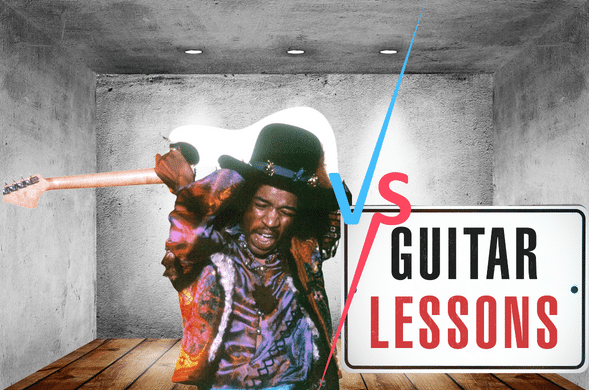

This was a very interesting read, and i do agree with the author that the guitar takes both talent and skill and let’s not forget lots of practice. I was a piano player growing up but was able to learn some guitar as well and I did not realize until trying it how difficult it actually can be whether your talented or not. I feel like anything in life with practice and dedication you can achieve your goals such as learning how to play the guitar.
Hi, PageJean
I appreciate your comments!
Yes, all musical instruments require lots of practice and dedication to improve as a player, no matter how much talent you have.
Perhaps you should give the guitar and piano another try. I such a wonderful thing to be able to play music every day!
Frank 🎸
Thanks so much for this encouraging article. I must be honest, I always wanted to learn to play the guitar. The truth is that I have tinnitus, a constant ringing noise in the ears. And that is one of the main reasons why I just did not start learning guitar.
I am thinking that it will aggravate my condition. But you made me realize that it could actually help improve my brain function(to some degree), and I guess I will never know until I try.
Do you recommend one to start with an acoustic or electric guitar?
Hi, Roopesh
Thank You for your comments!
You could begin with either an acoustic or electric guitar. You might be better off with an electric because you can play it without plugging it into an amplifier or keep the amp volume very soft.
With tinnitus, you want to avoid loud noise exposure, which can worsen your symptoms. You should follow up with your doctor to evaluate the problem if you haven’t already done so.
Best of luck, and let me know if you have any other questions! 😎
Frank 🎸
Hey Frank –
First, I am not musically inclined but always wanted to play the guitar. Like all things, it is a combination of skill and talent. This article has inspired me to learn. What schools would you recommend attending to learn how to play the guitar? Professional schools, that is.
Hi, Godwin
Thank You for your comments!
Professional training is one of the best ways to get started on the guitar. You can take private lessons at a music studio near you or attend classes at a school.
Check out the Berkeley College of Music and Musicians Institute.
Let me know if you have other questions and best of luck!
Frank 🎸
I’ve asked this question 1,000 times only to get no answer; hopefully you will be different. What is the right approach for me to take to make even the slightest bit of progress on the guitar? After 5 years of trying by taking weekly lessons and practicing everyday, I made zero progress. Don’t tell me that anybody can learn to play guitar, because that’s crap. I tried yet I still can’t, and it’s simply because I have no talent.
Hi, Mark
Sorry you’re having a tough time learning to play guitar. You’re obviously very interested and motivated to succeed. I’ll communicate with you in an email so that I can get more info and try to give you some helpful suggestions.?
Frank ?